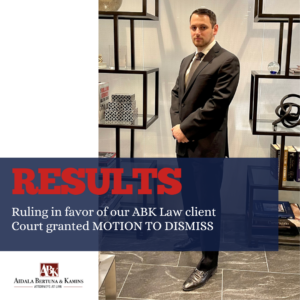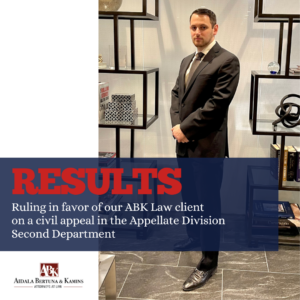
#ABKLaw RESULTS: Ruling in favor of our ABK Law client – Court granted MOTION TO DISMISS
#ABKLaw RESULTS: Ruling in favor of our ABK Law client – Court granted MOTION TO DISMISS

#ABKLaw RESULTS: Ruling in favor of our ABK Law client – Court granted MOTION TO DISMISS

#ABKLaw RESULTS: Ruling in favor of our ABK Law client on a civil appeal in the Appellate Division Second Department
In an attempt to get residents to throw away less garbage, the City of Seattle has given each household several different trash bins to put out to the curb – one for yard and food waste, one for recycling, and even smaller cans for stuff that is really trash.
The Justice Department and FBI have formally acknowledged that nearly every examiner in an elite FBI forensic unit gave flawed testimony in almost all trials in which they offered evidence against criminal defendants over more than a two-decade period before 2000.
Protests have been growing in Baltimore after a 25-year-old black man, Freddie Gray, died of a spinal cord injury that he sustained after he was taken into custody by several police officers.
Members of the Supreme Court rarely speak out publicly about their views on the sorts of issues that are likely to come before them. So it was notable when Justices Kennedy and Breyer sat before the House appropriations committee recently and talked about the plight of the American criminal justice system.
The first remedial measures from the stop-and-frisk litigation in New York City are beginning to trickle down from the courts to local police precincts.
According to a Danish lawyer from Copenhagen.
During protests in New York City over the past several weeks, a distinct piercing sound could be heard for the first time in this city. The noise, a high-pitched beeping noise, was being emitted from a long-range acoustic device that can shriek repetitive blasts of noise at a volume of up to 152 decibels.
You are minding your own business, double parked, engine running, while waiting for your friend to run into Chipotle and pick up some burritos. A police officer approaches you and tells you that you are parked illegally. He starts asking you questions……do you have to answer him? Can you drive away? What if he wants to search your car? Should you let him? Can he search it without your permission? If he chases you, do you have to stop?


